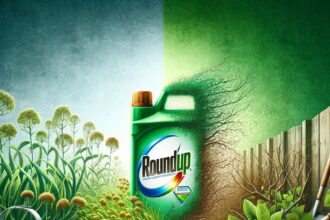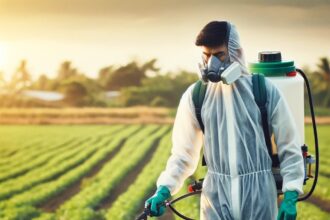Are roundups dangerous? Does that really mean anything? Roundup is a widely used herbicide known for its ability to control weeds and its use has been widely discussed due to recent safety concerns. What’s your answer? Are there any risks? Let us take note of what is actually going on here.
Roundup
For many years, Roundup, a popular herbicide produced by Monsanto, has been a household name for gardeners, farmers, and landscapers. Roundup weed killer has been extensively used in both agricultural and residential settings, making it a common tool for managing unwanted plants. It’s widely known for its effectiveness in killing weeds and ensuring crop health. However, the product has also become infamous due to allegations linking it to serious health risks, particularly cancer. These concerns have sparked numerous lawsuits and widespread media coverage, leaving many individuals worried about their exposure to this common herbicide.
Understanding the risks associated with Roundup is crucial for anyone who uses it or has been exposed to it. Studies have suggested a potential link between glyphosate, the active ingredient in Roundup, and non-Hodgkin lymphoma, a type of cancer. This connection has led to a surge in legal actions against Monsanto, now owned by Bayer, with plaintiffs claiming that the company failed to warn users about the potential dangers. At Mass Tort America, we understand the anxiety and confusion surrounding this issue and are here to provide support and guidance for those affected.
The Science Behind Glyphosate-Based Herbicides
Glyphosate, the primary ingredient in Roundup, is designed to kill weeds by inhibiting a specific enzyme pathway essential for plant growth. The glyphosate molecule works by inhibiting a specific enzyme pathway essential for plant growth. While this makes it highly effective as an herbicide, concerns have been raised about its safety for humans. The International Agency for Research on Cancer (IARC), part of the World Health Organization, classified glyphosate as “probably carcinogenic to humans” in 2015. This classification has fueled much of the controversy and litigation surrounding Roundup.
Despite the IARC’s classification, regulatory bodies like the Environmental Protection Agency (EPA) in the United States and the European Food Safety Authority (EFSA) have maintained that glyphosate is safe when used as directed. Concerns have also been raised about glyphosate residues in food products, which are monitored by regulatory agencies to ensure safety. These conflicting viewpoints have created a complex and often confusing landscape for consumers trying to understand the real risks associated with Roundup. The scientific community remains divided, with ongoing studies aiming to provide more definitive answers.
The legal battles over Roundup have brought significant attention to the potential health risks of glyphosate. The toxicity of pesticide formulations, including those containing glyphosate, is a critical aspect of regulatory assessments. Plaintiffs in these cases have often presented evidence suggesting that Monsanto knew about the dangers but failed to adequately warn consumers. The outcomes of these cases have varied, with some resulting in substantial verdicts for the plaintiffs and others favoring the defense. These legal precedents play a crucial role in shaping future litigation and consumer protection measures.
Legal Implications And Consumer Rights Of Glyphosate Exposure
As the number of lawsuits against Monsanto continues to grow, it’s essential to understand the legal rights of individuals who may have been affected by Roundup. Victims claim that prolonged exposure to glyphosate has led to serious health issues, and they seek compensation for medical expenses, lost wages, and pain and suffering. Victims claim that prolonged Roundup exposure has led to serious health issues, including cancer. The legal framework for these cases typically involves product liability claims, alleging that Monsanto failed to ensure the safety of Roundup and neglected to provide adequate warnings about its potential dangers.
Successful litigation requires comprehensive evidence linking the use of Roundup to the health issues experienced by the plaintiffs. This often involves medical records, expert testimonies, and scientific studies that demonstrate the potential risks of glyphosate. Scientific studies and expert testimonies often highlight the potential risks of glyphosate to human health. Navigating these complex legal waters can be challenging, and having experienced legal representation is crucial for individuals seeking justice and compensation.
Consumers also have rights under various consumer protection laws designed to safeguard them from harmful products. Regulatory agencies like the EPA and the Food and Drug Administration (FDA) play vital roles in monitoring and regulating the safety of products like Roundup. Understanding these rights and the regulatory framework can empower individuals to take action if they believe they have been harmed by a product.
Moving Forward: Health And Safety Precautions For Roundup Exposure
Given the ongoing debates and legal battles over Roundup, it’s important for consumers to take proactive steps to protect their health. If you use Roundup or similar herbicides, following safety guidelines can minimize your exposure to potentially harmful chemicals. This includes wearing protective clothing, using the product in well-ventilated areas, and strictly adhering to the usage instructions provided by the manufacturer. Consumers should also be aware of potential dietary exposure to glyphosate through food and beverages.
For those who have already been exposed and are experiencing health issues, seeking medical advice is essential. Early diagnosis and treatment can significantly improve outcomes, especially for conditions like non-Hodgkin lymphoma. It’s also crucial to keep detailed records of your exposure and any related health problems, as this information can be vital if you decide to pursue legal action. Roundup is effective in controlling broadleaf weeds, which are common in both agricultural and residential areas.
Staying informed about the latest research and regulatory updates on glyphosate and Roundup can help you make better decisions regarding its use. As new studies emerge and legal cases progress, the understanding of the risks associated with this herbicide continues to evolve. Being proactive about your health and safety is the best way to navigate these uncertainties.
Why Choose Mass Tort America For Your Glyphosate Exposure Case?
At Mass Tort America, we have extensive experience handling cases related to harmful products like Roundup. Our dedicated team understands the complexities involved in these lawsuits and is committed to helping victims secure the compensation they deserve. We offer personalized legal support, ensuring that each client’s case is handled with the utmost care and attention to detail.
We know that dealing with health issues related to glyphosate exposure can be overwhelming. Our goal is to make the legal process as smooth and stress-free as possible. With a nationwide presence and a Concierge Team to assist with every aspect of your case, we are well-equipped to provide the support you need. Contact us today at 800-356-4338 or visit our contact form at https://masstortamerica.com/contact/ to learn more about how we can help you.



















